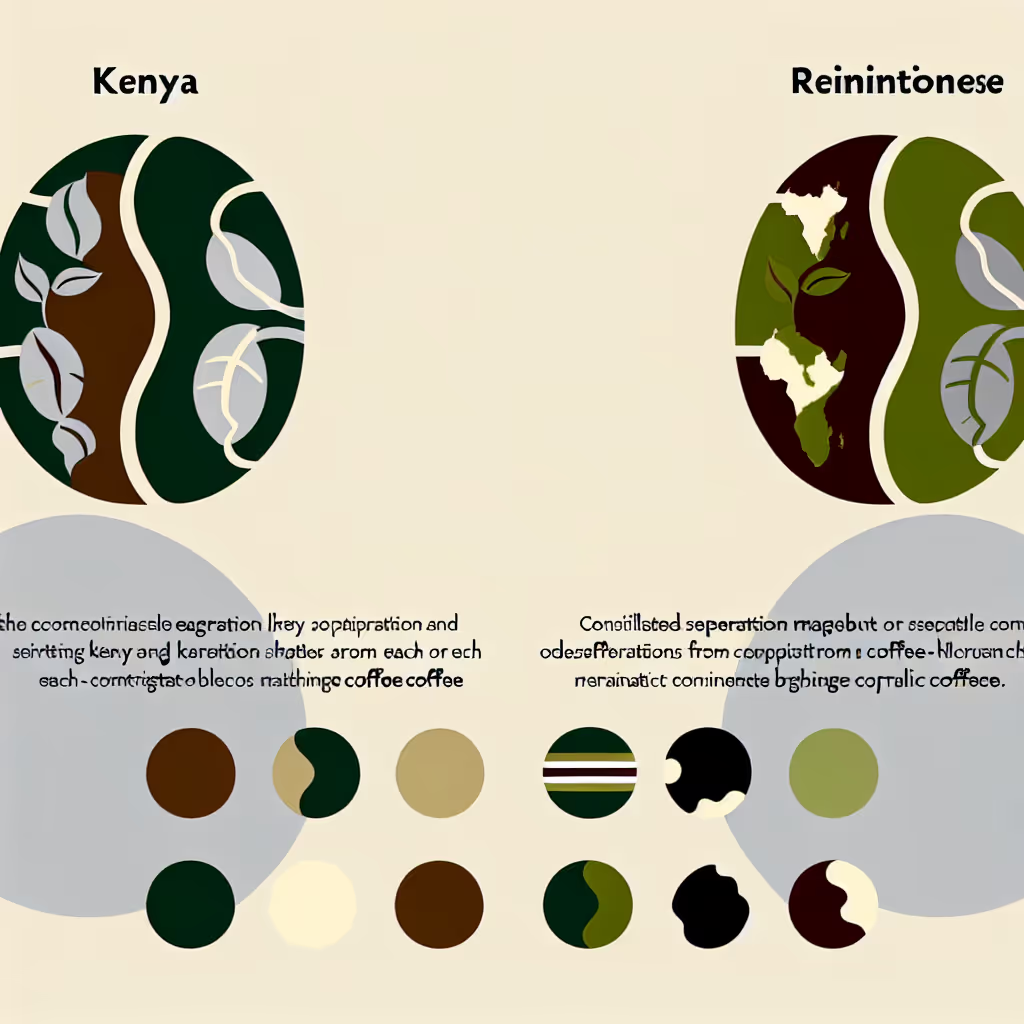Kenyan Vs. Cuban Coffee
This comparison explores the rich, bright Kenyan coffee against the smooth, sweet Cuban coffee, examining their distinct flavor profiles, growing conditions, and cultural significance in the world of specialty coffee.

Brief Description
Kenyan coffee is renowned for its bright acidity, full body, and complex flavor profile. Grown in the rich volcanic soils of the Central Highlands, these beans benefit from ideal climate conditions and meticulous processing. The result is a cup that's bold, wine-like, and often described as the 'connoisseur's choice'. With notes ranging from blackcurrant to citrus, Kenyan coffee offers a truly unique and memorable tasting experience.
Cuban coffee is renowned for its rich history and unique flavor profile. Grown primarily in the Sierra Maestra Mountains, these beans thrive in the island's tropical climate and fertile soil. Cuban coffee is characterized by its full body, low acidity, and distinctive sweetness, often with notes of tobacco and dark chocolate. Despite facing challenges in production and export, Cuban coffee remains a prized commodity, celebrated for its smooth taste and cultural significance.
Importance of Comparison
Comparing Kenyan and Cuban coffee is crucial for coffee enthusiasts seeking to expand their palate and understand the diverse world of coffee origins. These two distinct regions offer contrasting flavor profiles, growing conditions, and processing methods, providing valuable insights into how geography and culture influence coffee taste. Understanding these differences helps consumers make informed decisions when purchasing beans or ordering at specialty cafes.
Key Attributes
Origin
Kenyan
Cuban


Consumer Guide
When choosing between Kenyan and Cuban coffee, consider your flavor preferences. If you enjoy bright, complex flavors with high acidity, Kenyan coffee is an excellent choice. Look for beans with blackcurrant, citrus, and floral notes, best brewed using pour-over or French press methods. For those who prefer a smoother, less acidic cup with rich, earthy flavors, Cuban coffee is ideal. Seek out beans with tobacco, dark chocolate, and earthy notes, perfect for espresso or Moka pot brewing. Consider the altitude at which the beans are grown: Kenyan coffee typically comes from higher elevations (1400-2100m), while Cuban coffee grows at lower altitudes (800-1700m). This affects the bean density and flavor complexity. Lastly, consider the processing methods: Kenyan coffee often undergoes double fermentation, while Cuban coffee may be natural or honey processed, each imparting unique characteristics to the final cup.
Expert Opinions
Coffee expert Maria Rodriguez notes, 'Kenyan coffee is often described as the 'wine of coffee' due to its complex acidity and fruity notes. In contrast, Cuban coffee offers a nostalgic, full-bodied experience reminiscent of old-world charm.' Roastmaster John Smith adds, 'The double fermentation process used in Kenya results in an incredibly clean, bright cup, while the natural processing common in Cuba contributes to its distinctive sweetness and full body. Both origins offer unique experiences that showcase the diversity of coffee flavors.'
FAQs
Kenyan coffee is known for its bright acidity, full body, and complex flavor profile with notes of blackcurrant, citrus, and floral undertones. Cuban coffee, on the other hand, is characterized by its full body, low acidity, and distinctive sweetness, often featuring notes of tobacco, dark chocolate, and earthy flavors.
Kenyan coffee is typically grown in the Central Highlands at altitudes between 1400-2100 meters in rich volcanic soils. Cuban coffee is primarily cultivated in the Sierra Maestra Mountains at lower altitudes of 800-1700 meters in a tropical climate with fertile soil. These differences in altitude and climate contribute to the distinct flavor profiles of each origin.
For Kenyan coffee, pour-over, French press, and cold brew methods are excellent choices to highlight its bright acidity and complex flavors. Cuban coffee is best enjoyed as espresso, prepared in a Moka pot, or brewed using a French press to emphasize its full body and rich flavors.
Kenyan coffee typically undergoes washed processing with a unique double fermentation method, followed by sun-drying. This results in a clean, bright cup. Cuban coffee may be processed using washed, natural, or honey methods, each imparting different characteristics to the final product. The natural and honey processes contribute to the coffee's sweetness and full body.
Kenya produces significantly more coffee annually, with an average output of 50,000 metric tons. Cuba's annual production is lower, at around 20,000 metric tons. This difference in production volume can affect availability and pricing of beans from each origin.
In Kenya, coffee is primarily an export crop and a significant contributor to the economy. The country is renowned for its high-quality beans in the specialty coffee market. In Cuba, coffee holds deep cultural significance, with a long history of production and consumption. Cuban coffee culture is characterized by strong, sweet espresso-based drinks that are an integral part of daily social interactions.
Conclusion
Kenyan and Cuban coffees offer distinct and contrasting experiences for coffee enthusiasts. Kenyan coffee shines with its bright acidity, complex flavors, and wine-like qualities, making it a favorite among those who appreciate a bold, vibrant cup. Cuban coffee, with its smooth, sweet profile and rich history, provides a unique taste of the island's coffee culture. When choosing between the two, consider your flavor preferences, brewing methods, and desire for either a bright, complex cup (Kenyan) or a smooth, full-bodied experience (Cuban). Both origins showcase the incredible diversity in the world of coffee and are worth exploring for any serious coffee lover.






